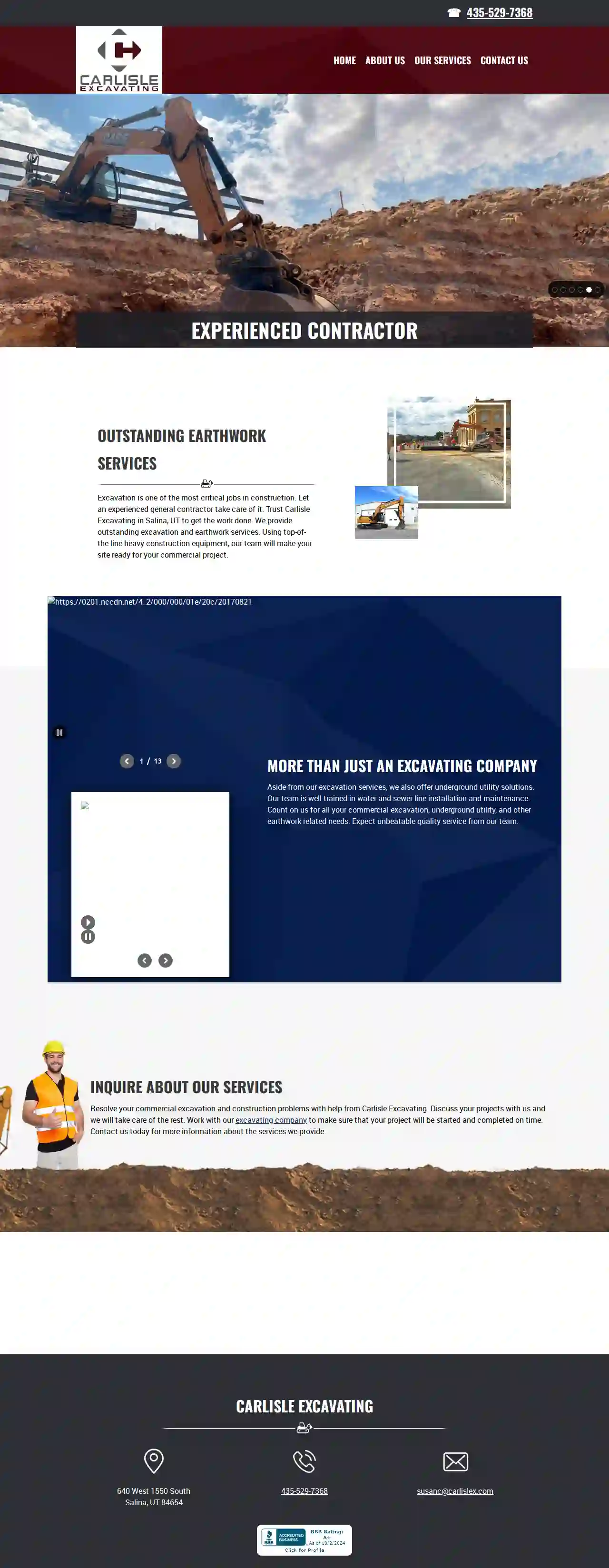Dirt Contractors Carlisle
Best Dirt Contractor in Carlisle
Receive multiple Dirt Contractor quotes for your project today! Compare profiles, reviews, accreditations, portfolio, etc... and choose the best deal.

Carlisle Excavating
4.88 reviews640 West 1550 South, Salina, 84654, GBDependable Construction Company Hire a reputable contractor to work on your construction project. When it comes to prompt and dependable commercial excavation services, Carlisle Excavating in Salina, UT is the construction company you can count on. We are committed to delivering high-quality work that will give you complete satisfaction. Our team has extensive experience in the industry and can handle minor to complicated earthmoving jobs. We serve the southern half of the state of Utah. Why Choose Us? Equipped, Honest, and Knowledgeable Team Excellent Customer Service Free Estimates Available Licensed and Insured Construction Company Quick Turnaround Time Give Us a Call Today Every member of our staff works hard to earn your trust and exceed your expectations. Place your confidence in our construction team and you will not be disappointed with the quality of work. Give us a call today to learn more about our excavation and other earthmoving services. We are more than happy to assist you with your concerns.
- Services
- Why Us?
- Gallery
Get Quote- Bo
Border Groundworks and Maintenance
52 reviewsCarlisle, GB- Services
- Why Us?
Get Quote - St
Stephen Carruthers
1Carlisle, GB- Services
- Why Us?
Get Quote - Ga
Gary Ward Drainage
54 reviewsCarlisle, GB- Services
- Why Us?
Get Quote - Ho
Howard Armstrong Drainage
517 reviewsCarlisle, GB- Services
- Why Us?
Get Quote - Ki
Kirkaldy & Roe Ltd
3.73 reviewsCarlisle, GB- Services
- Why Us?
Get Quote
Over 11,537+ Excavation Pros on our platform
Our excavation providers operate in Carlisle & surrounding areas!
ExcavationHQ has curated and vetted the Best Excavation Pros arround Carlisle. Find a reliable contractor today.
Frequently Asked Questions About Dirt Contractors
- Spring and Fall: Generally considered the optimal seasons in many regions, as the weather is typically mild and the ground is workable.
- Summer: Can be suitable if the weather isn't excessively hot and dry, but ensure adequate watering to prevent soil from drying out.
- Winter: Often challenging due to frozen ground, snow, and potential for delays. However, some contractors may be available for deliveries if conditions permit.
- **Good Drainage:** Allows excess water to drain away, preventing waterlogging and root rot.
- **Adequate Aeration:** Provides sufficient air pockets for root respiration.
- **Nutrient Retention:** Holds onto essential nutrients for plant uptake.
- **Easy to Work With:** Not too heavy or too light, making it manageable for digging and planting.
- Increases Soil Stability: Compacted soil is less likely to shift, settle, or erode, providing a stable foundation for structures, walkways, or driveways.
- Improves Drainage: Compaction can enhance drainage by reducing the soil's porosity and allowing water to flow more efficiently.
- Reduces Settlement: Proper compaction minimizes future settling, preventing uneven surfaces or structural damage.
- Enhances Load-Bearing Capacity: Compacted soil can support heavier loads without excessive compression or deformation.
- Project Scope: The size and complexity of the project, including the volume of dirt to be moved, the distance for hauling, and the type of services required.
- Dirt Type: Different dirt types have varying costs based on availability and demand. Topsoil is typically more expensive than fill dirt.
- Location: Costs may differ depending on the contractor's location and the accessibility of the project site.
- Equipment Needed: Specialized equipment, such as excavators, bulldozers, or dump trucks, can influence the overall cost.
- Labor Costs: The number of workers and their hourly rates will affect the labor portion of the cost.
What is the best time of year to have dirt delivered?
What is the best type of dirt for my garden?
What is dirt compaction, and why is it important?
How much does it cost to hire a dirt contractor?
What is the best time of year to have dirt delivered?
- Spring and Fall: Generally considered the optimal seasons in many regions, as the weather is typically mild and the ground is workable.
- Summer: Can be suitable if the weather isn't excessively hot and dry, but ensure adequate watering to prevent soil from drying out.
- Winter: Often challenging due to frozen ground, snow, and potential for delays. However, some contractors may be available for deliveries if conditions permit.
What is the best type of dirt for my garden?
- **Good Drainage:** Allows excess water to drain away, preventing waterlogging and root rot.
- **Adequate Aeration:** Provides sufficient air pockets for root respiration.
- **Nutrient Retention:** Holds onto essential nutrients for plant uptake.
- **Easy to Work With:** Not too heavy or too light, making it manageable for digging and planting.
What is dirt compaction, and why is it important?
- Increases Soil Stability: Compacted soil is less likely to shift, settle, or erode, providing a stable foundation for structures, walkways, or driveways.
- Improves Drainage: Compaction can enhance drainage by reducing the soil's porosity and allowing water to flow more efficiently.
- Reduces Settlement: Proper compaction minimizes future settling, preventing uneven surfaces or structural damage.
- Enhances Load-Bearing Capacity: Compacted soil can support heavier loads without excessive compression or deformation.
How much does it cost to hire a dirt contractor?
- Project Scope: The size and complexity of the project, including the volume of dirt to be moved, the distance for hauling, and the type of services required.
- Dirt Type: Different dirt types have varying costs based on availability and demand. Topsoil is typically more expensive than fill dirt.
- Location: Costs may differ depending on the contractor's location and the accessibility of the project site.
- Equipment Needed: Specialized equipment, such as excavators, bulldozers, or dump trucks, can influence the overall cost.
- Labor Costs: The number of workers and their hourly rates will affect the labor portion of the cost.